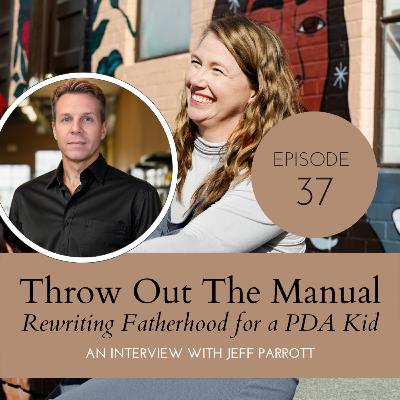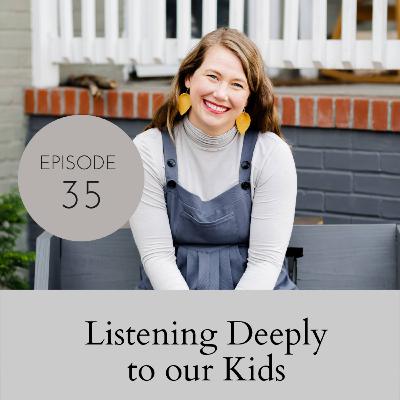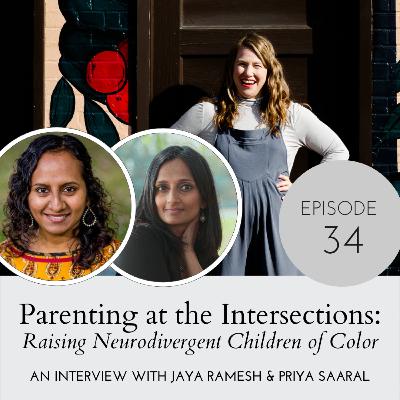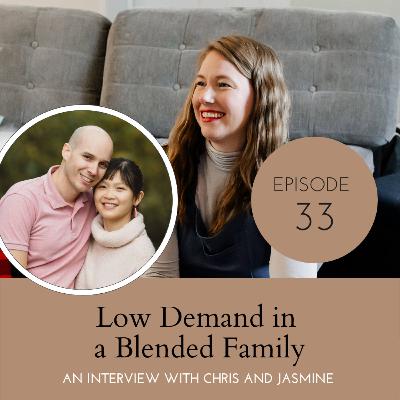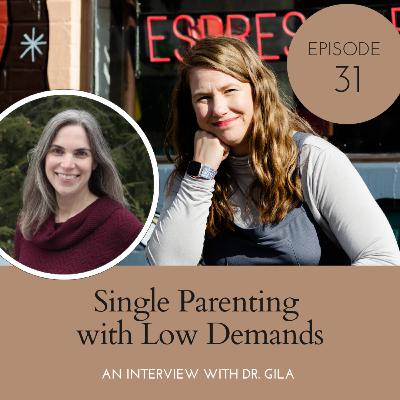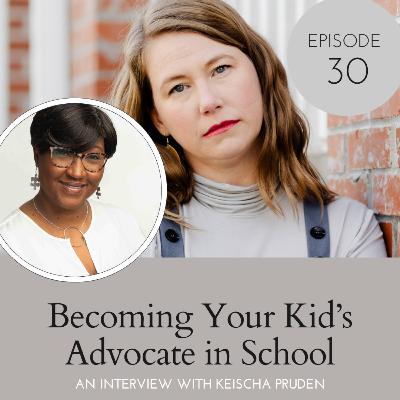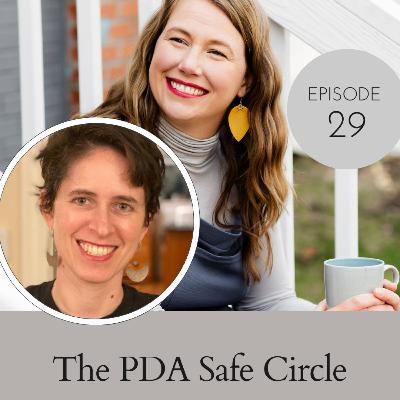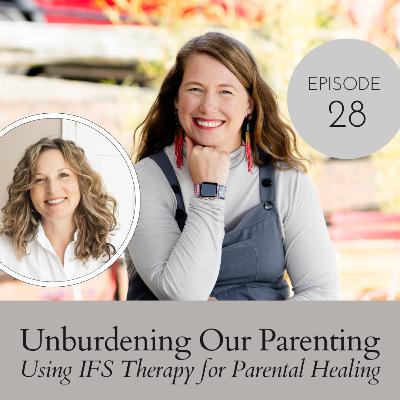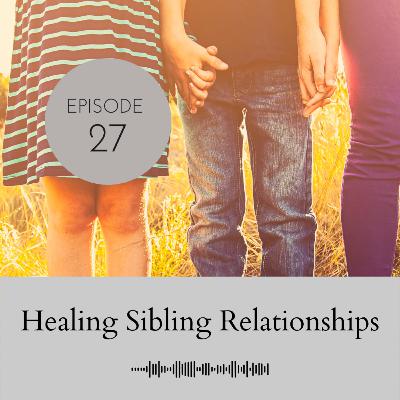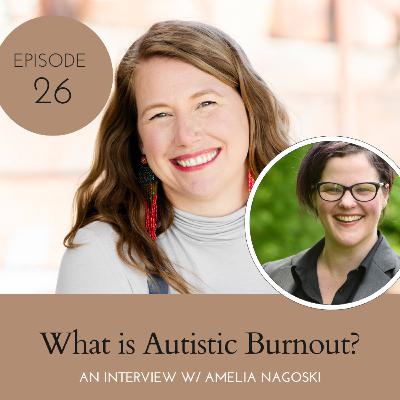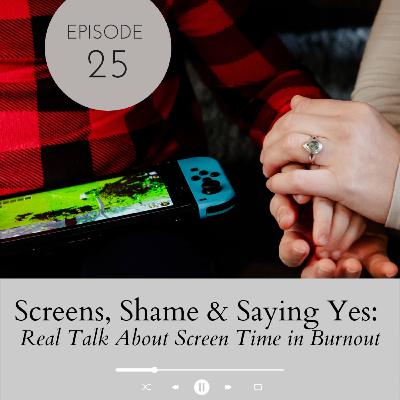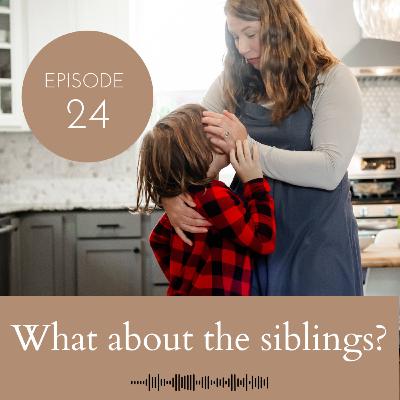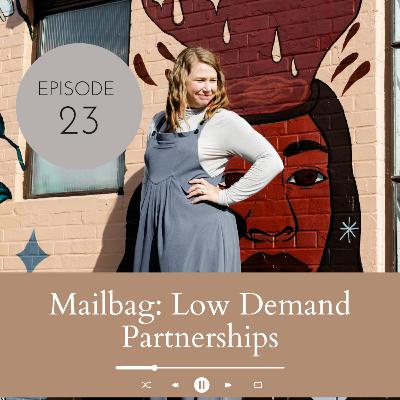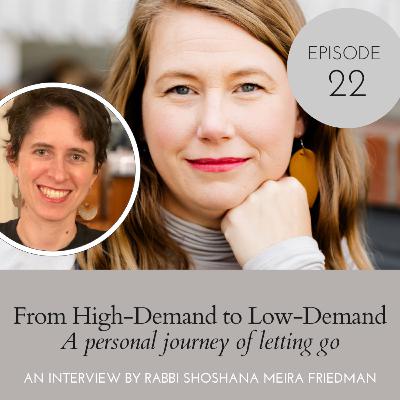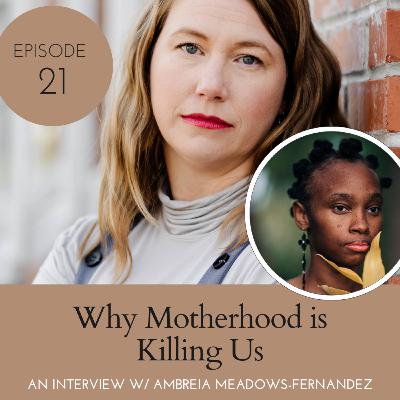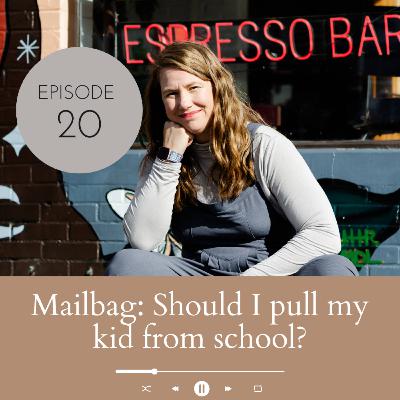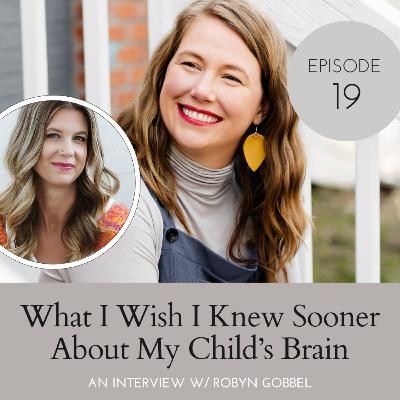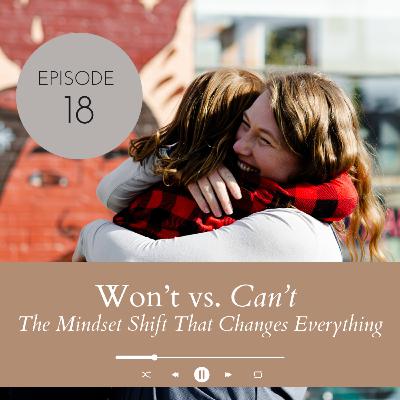Discover Low Demand Parenting
Low Demand Parenting

Low Demand Parenting
Author: Amanda Diekman
Subscribed: 59Played: 604Subscribe
Share
© 2025 Amanda Diekman
Description
The Low Demand Parenting Podcast is your space to let go of the pressure and embrace a more joyful, authentic approach to parenting. Hosted by Amanda Diekman—author, autistic adult, and mom of three—this podcast isn’t about perfection or expert advice. It’s about learning together how to drop the demands that weigh us down and find the ease we crave in our families. Whether you’re navigating neurodivergence, challenging behaviors, or simply the highs and lows of life, this show offers honest conversations, practical insights, and a whole lot of compassion. Let's thrive, even when it feels like life is on level 12 hard.
38 Episodes
Reverse
In this episode, I sit down with my friend and neighbor Jeff Parrott to talk about parenting a PDA, pressure-sensitive child while letting go of the “typical” parenting manual. Jeff shares their family’s pivot from high academic expectations to unschooling, how discovering PDA reframed everything, and why consent became the key non-negotiable in their parenting. He walks me through his family’s practical, proactive demand-drops (like rethinking laundry and mealtimes), handling criticism as a father, and the affirmation that anchors him: “connection over correction.” If you’ve ever wondered how to live out your low demand beliefs when your identity is tied to achievement, this conversation is a powerful roadmap.
About Jeff:
Jeff Parrott is a proud father and husband in a neurodiverse family and is committed to learning from his lived experience practicing Low Demand. With a focus on personal growth, he is committed to the appreciation, understanding, and support of neurodiversity, sensory sensitivities, Pervasive Drive for Autonomy (PDA), and Low Demand. Jeff has B.E. degrees in engineering (Biomedical and Electrical) and a Ph.D. in Biomedical Sciences (Women’s Health and Reproductive Endocrinology) and has much experience in academic and pharmaceutical development laboratories. A persistent problem solver, he strives to find everyday solutions that work for his beautiful, developing, gifted family. In this space, he identifies with the username @JeffAugmen. “Augmen” is a Latin for “growth.
Mentions in this episode:
Occupational therapist Jenna Meehan, of Be Me OT in Durham, NC: https://www.bemeot.com/
PDA framing; “pressure-sensitive kids” (Dr. Naomi Fisher, reference by Jeff)
Additional Resources:
Low Demand Parenting book: a love letter to exhausted, overwhelmed parents everywhere. Get the first chapter free!
Why is everything with my kid so hard?: Take the quiz to find your first step forward!
Low Demand Parenting Blog: a treasure trove of low demand wisdom
Follow us on social for updates on the podcast, blog, and more!
Instagram
Facebook
Pinterest
The Low Demand Parenting Podcast is your space to let go of the pressure and embrace a more joyful, authentic approach to parenting. We hope you enjoyed this episode and would be honored if you left us a review which helps us reach more parents just like you!
In this episode, I sit down with writer and disabled parent Jessica Slice about what it looks like to practice low demand parenting… and also not. Jessica shares how parenting her autistic daughter showed her that “endless freedom” actually made her child more anxious — and that loving, predictable structure was the real low demand move for their family. We talk about how disability culture dismantles shame, why some kids panic in the face of too many choices, how to build rules that are genuinely child-centered, and why no one on the internet gets to tell you whether you’re “doing low demand right.” This conversation is a permission slip for families who need containers, timers, and posted rules on the wall, not because you’re trying to control your kid, but because that’s what actually lowers demands in your unique family culture.
In this episode we talk about:
Why “low demand” can’t be one-size-fits-all
How Jessica realized unlimited choice was actually the demand for her autistic daughter
The family’s TV setup: timers, platform limits, and why it calms her kid
Using rules to reduce suffering, not to control behavior
Parenting inside disability culture — naming needs without shame
The difference between “parent-imposed rules” and “kid-centered structure”
Letting go of performing “good parenting” for outsiders
Why no one can look from the outside and decide whether what you’re doing is “low demand”
My Guest:Jessica Slice is the Toronto author of four books about disability and has written for the New York Times, the Washington Post, the Wall Street Journal, the Atlantic, the Guardian, The Globe & Mail, LitHub, Alice Wong’s bestselling Disability Visibility, Slate, Glamour, Cosmopolitan, and more. She’s also been featured in Vogue, The New Yorker, PBS, NPR, The Cut, the BBC, and more. She lives with her husband, two kids, and two dogs.
https://www.jessicaslice.com/
https://bookshop.org/shop/jessicaslice
https://jessicaslice.substack.com/
Additional Resources:
Get the customized coaching you desire and deserve with my wonderful Low Demand Coaching Team!
Low Demand Parenting book: a love letter to exhausted, overwhelmed parents everywhere. Get the first chapter free!
Why is everything with my kid so hard?: Take the quiz to find your first step forward!
Low Demand Parenting Blog: a treasure trove of low demand wisdom
Follow us on social for updates on the podcast, blog, and more!
Instagram
Facebook
Pinterest
The Low Demand Parenting Podcast is your space to let go of the pressure and embrace a more joyful, authentic approach to parenting. We hope you enjoyed this episode and would be honored if you left us a review which helps us reach more parents just like you!
In this solo episode, I get to dive into one of the most radical, healing, and countercultural practices in Low Demand Parenting: listening deeply to our kids. As the third step in the six-step Low Demand Method, listening is the heart of it all—the bridge between understanding and letting go. Together we will explore how to listen when our kids won’t answer a single question, when what they say triggers us, and when their truth doesn’t match what we wanted to hear. I share real-life stories, practical tools (like “bark if you love cereal!”), and deep reflections on the power of curiosity, differentiation, and radical humility. This episode will help you release the pressure to “get it right,” and instead, open your ears—and your heart—to what your child is really communicating.
Additional Resources:
Low Demand Coaching with our incredible team. Receive support and compassion; get un-stuck with practical help; find someone to talk to who fully gets it.
Low Demand Parenting book: a love letter to exhausted, overwhelmed parents everywhere. Get the first chapter free!
Why is everything with my kid so hard?: Take the quiz to find your first step forward!
Low Demand Parenting Blog: a treasure trove of low demand wisdom
Follow us on social for updates on the podcast, blog, and more!
Instagram
Facebook
Pinterest
The Low Demand Parenting Podcast is your space to let go of the pressure and embrace a more joyful, authentic approach to parenting. We hope you enjoyed this episode and would be honored if you left us a review which helps us reach more parents just like you!
What happens when parenting meets the deep work of liberation? In this episode, I talk with Jaya Ramesh and Priya Saaral, authors of Parenting at the Intersections, about raising neurodivergent children of color, unlearning oppressive systems, and redefining what it means to love our kids exactly as they are.
Together, they explore how intersectionality shapes parenting, why “expert culture” often misses the mark, and how resistance, both ours and our children’s, is a form of love. This is a tender, eye-opening conversation about healing generational wounds, honoring ancestral wisdom, and raising children who belong without apology.
About my Guests
Priya Saaral, LICSW, RPT-S is a proud mama, play therapist and parenting coach specializing in the emotional wellbeing of neurodivergent children and parents by helping them reconnect to their playful spirit amidst personal and structural adversity. She is a late-identified neurodivergent person with caste privilege and a first generation immigrant settler from India and Singapore, settled on Duwamish land (Seattle).
Jaya Ramesh, LMHC is psychotherapist in private practice, specializing in supporting BIPOC and neurodivergent individuals and couples in having more authentic relationships. She also runs a DEI consultancy supporting communities and organizations in creating more anti-racist spaces. She identifies as a caste-privileged Indian-American who is neurodivergent. She is married, raising two kids and an adorable dog and lives on the unceded lands of Duwamish (colonially known as Seattle).
Read "Parenting at the Intersections"
Jaya Ramesh Counseling
Priya Saaral - Play Therapy and Parent Coaching
Additional Resources
Low Demand Parenting book: a love letter to exhausted, overwhelmed parents everywhere. Get the first chapter free!
Why is everything with my kid so hard?: Take the quiz to find your first step forward!
Low Demand Parenting Blog: a treasure trove of low demand wisdom
Follow us on social for updates on the podcast, blog, and more!
Instagram
Facebook
Pinterest
The Low Demand Parenting Podcast is your space to let go of the pressure and embrace a more joyful, authentic approach to parenting. We hope you enjoyed this episode and would be honored if you left us a review which helps us reach more parents just like you!
In this raw, tender conversation, Chris and Jasmine open up about navigating a “big blended family crisis,” discovering PDA, and rebuilding connection in a stepfamily with three kids. They share the pressure cooker of custody battles, school expectations, aggression at home, and the moment low-demand and CPS (Ross Greene) reframed everything around autonomy and safety. We talk deconditioning from “good parent” scripts, stepmom complexity, marriage repair, and how Chris’s autistic burnout changed the pace of their whole family. It’s honest, nuanced, and deeply human.
📌 Content note: brief mention of a child’s disclosure of self-harm early in the story.
Guest Bio
Ten years married, Chris and Jasmine are an interracial couple raising three PDA kids aged 14,6 and 4 in Goolwa Beach, South Australia. They navigated an intense blended family crisis with intense child behaviors, catalysing their conscious parenting journey before discovering PDA. Chris is an entrepreneur and a coach who helps people reprogram their reality. Jasmine is the author of Behind That Shiny Resume. She supports stepmoms navigating complex family dynamics as well as neurodiverse couples.
Follow their journey at @unschooling.pda on Instagram
Find stepmum support at Linktr.ee/stepmumcoach
Additional Resources
Low Demand Parenting book: a love letter to exhausted, overwhelmed parents everywhere. Get the first chapter free!
Why is everything with my kid so hard?: Take the quiz to find your first step forward!
Low Demand Parenting Blog: a treasure trove of low demand wisdom
Follow us on social for updates on the podcast, blog, and more!
Instagram
Facebook
Pinterest
The Low Demand Parenting Podcast is your space to let go of the pressure and embrace a more joyful, authentic approach to parenting. We hope you enjoyed this episode and would be honored if you left us a review which helps us reach more parents just like you!
In this solo episode, I reframe “low-demand” beyond crisis triage and into a proactive, sustainable practice. I explain why dropping demands only in the moment can leave parents burned out—and how to move toward durable drops that create real ease and joy for everyone. Using a concrete “can’t get out of bed for school” example, I show you how to become a demand detective, uncover the deeper beliefs and personal history driving our pressure, and design accommodations that actually work. We also tackle internally driven demands (especially with teens), dismantling the cultural “shoulds,” and why believing yourself is the first liberating step to building a life that fits your child—and you.
Additional Resources:
Low Demand Parenting book: a love letter to exhausted, overwhelmed parents everywhere. Get the first chapter free!
Why is everything with my kid so hard?: Take the quiz to find your first step forward!
Low Demand Parenting Blog: a treasure trove of low demand wisdom
Follow us on social for updates on the podcast, blog, and more!
Instagram
Facebook
Pinterest
The Low Demand Parenting Podcast is your space to let go of the pressure and embrace a more joyful, authentic approach to parenting. We hope you enjoyed this episode and would be honored if you left us a review which helps us reach more parents just like you!
Parent coach, clinical psychologist, neuropsychologist, and single mom Dr. Gila shares hard-won, compassionate guidance for solo parents of high-needs kids: naming the grief and stressors unique to single parenting, why stress is “the great magnifier,” and how radical permission + perspective help us stay out of shame and make workable choices. We get concrete about the “tiger in the room” (what to do when the meltdown is happening right now), expanding what counts as support (yes, screens sometimes), asking for help when choice A isn’t available, and building micro-practices—audio journaling, body-based resets, and community—to keep one adult resourced when there’s no one to tag in.
Meet our guest:
Dr. Gila (she/her) is a Jai-certified parenting coach and certified Clini-Coach®, in addition to being a clinical psychologist and neuropsychologist. Most importantly, she’s a single mom to a beautifully complex kid. Dr. Gila is passionate about parenting with connection, NOT perfection. She specializes in supporting single parents, and parents of strong-willed, spirited, or neurodivergent kids. Her motto is: Even if you're on your own, you don't have to do it alone!
Biz name: Dr. Gila Parenting
Website: www.drgilaparenting.com
Email: info@drgilaparenting.com
IG: www.instagram.com/drgila_parenting
FB: www.facebook.com/drgilaparenting/
Podcast Single-Parenting with Connection (NOT Perfection): https://podcasts.apple.com/us/podcast/single-parenting-with-connection-not-perfection/id1840297689
Facebook group: Single-Parenting with Connection, not Perfection (https://www.facebook.com/share/g/154KRmy72k/)
Free Guided Meditation for Single Parents (or anyone who feels like one!): https://www.drgilaparenting.com/SP_meditation
Additional Resources:
Low Demand Parenting book: a love letter to exhausted, overwhelmed parents everywhere. Get the first chapter free!
Why is everything with my kid so hard?: Take the quiz to find your first step forward!
Low Demand Parenting Blog: a treasure trove of low demand wisdom
Follow us on social for updates on the podcast, blog, and more!
Instagram
Facebook
Pinterest
The Low Demand Parenting Podcast is your space to let go of the pressure and embrace a more joyful, authentic approach to parenting. We hope you enjoyed this episode and would be honored if you left us a review which helps us reach more parents just like you!
In this conversation, therapist and long-time school advocate Keischa Pruden shares 25 years of hard-won wisdom on helping neurodivergent kids access safety and learning inside traditional schools. We talk whole-child lenses (bio-psycho-social), what actually derails learning (surprise transitions, sensory overload, inflexible expectations), and how to build a true “village” between home and school. Keischa walks through the key components of practical school advocacy—and names the heavy load parents carry (and why support is non-negotiable). It’s a compassionate, concrete guide to lowering demands at school without losing sight of what matters most: each child’s definition of a meaningful day.
Meet our guest:
Learn more about Keischa Pruden here.
Additional Resources:
Low Demand Parenting book: a love letter to exhausted, overwhelmed parents everywhere. Get the first chapter free!
Why is everything with my kid so hard?: Take the quiz to find your first step forward!
Low Demand Parenting Blog: a treasure trove of low demand wisdom
Follow us on social for updates on the podcast, blog, and more!
Instagram
Facebook
Pinterest
The Low Demand Parenting Podcast is your space to let go of the pressure and embrace a more joyful, authentic approach to parenting. We hope you enjoyed this episode and would be honored if you left us a review which helps us reach more parents just like you!
In this rich, practical conversation, Rabbi Shoshana Meira Friedman—PDA adult, rabbi, and creator of the PDA Safe Circle—maps out a body-based way to understand PDA using her “safe circle” metaphor. We explore why capacity, not compliance, defines what’s truly “safe,” how trauma can sensitize antenna without being the cause of PDA, and what actually widens a nervous system’s circle.
Learn more about Shoshana:
Experience a free week in the PDA Safe Circle community
Download the PDA Safe Circle Coloring Book (for free!)
Follow Shoshana on Instagram
Additional Resources:
Low Demand Course - a powerful 6 week course to learn the 6-step Low Demand approach and change your parenting journey! Enrolling now through September 15.
Low Demand Parenting book: a love letter to exhausted, overwhelmed parents everywhere. Get the first chapter free!
Why is everything with my kid so hard?: Take the quiz to find your first step forward!
Low Demand Parenting Blog: a treasure trove of low demand wisdom
Follow @LowDemandAmanda on social for updates on the podcast, blog, and more!
Instagram
Facebook
Pinterest
The Low Demand Parenting Podcast is your space to let go of the pressure and embrace a more joyful, authentic approach to parenting. We hope you enjoyed this episode and would be honored if you left us a review which helps us reach more parents just like you!
In this episode, I welcome Dr. Angele Close, a psychologist, motherhood coach, and author, to discuss the transformative power of Internal Family Systems (IFS) therapy in parenting. We explore how understanding and healing our internal parts can lead to more effective, compassionate, and empowering low-demand parenting. Dr. Close shares her personal journey with IFS, how it changed her approach to parenting her neurodivergent son, and offers practical insights into how parents can shift their inner dialogues to better manage triggers and stress. Our personal and raw conversation sheds light on the importance of unburdening ourselves from societal expectations and embracing the dynamic healing journey, which gifts us with a richer relationship to our children and ourselves.
Bio:
Dr. Angele Close is a clinical psychologist, motherhood coach, and certified mindfulness teacher who supports mothers and couples through the emotional challenges of parenting and partnership. A mom to a neurodivergent teen, she discovered the therapeutic model of Internal Family Systems (IFS) during her own parenting journey and found its tools transformational. Practicing and training in IFS helped her shift from chronic reactivity to greater clarity, calm, and compassion, for her kids and herself.
Dr. Close now brings this approach to her clients, guiding them to feel more grounded, connected, and confident through their own inner healing. She is the author of the forthcoming book Unburdening Motherhood and is passionate about helping parents apply IFS in everyday moments so they can not only show up with the steady, wise presence their children and relationships need most, but also experience more ease, joy, and fulfillment in parenting.
-
Episode Resources:
5 part free video series - https://www.drangeleclose.com/courses
IFS Book: You Are The One You've Been Waiting For
IFS Workbook
Dr. Close is also hosting a workshop/webinar for PDA North America August 21st (6pm CST) titled Finding Calm in the Chaos: How Internal Family Systems Can Shift the Way You Parent.
-
Additional Resources:
When Siblings Feel Like Enemies - a DIY course for overwhelmed PDA families navigating constant sibling conflict
Low Demand Parenting book: a love letter to exhausted, overwhelmed parents everywhere. Get the first chapter free!
Why is everything with my kid so hard?: Take the quiz to find your first step forward!
Low Demand Parenting Blog: a treasure trove of low demand wisdom
-
Follow us on social for updates on the podcast, blog, and more!
Instagram
Facebook
Pinterest
-
The Low Demand Parenting Podcast is your space to let go of the pressure and embrace a more joyful, authentic approach to parenting. We hope you enjoyed this episode and would be honored if you left us a review which helps us reach more parents just like you!
In this episode, we delve into the intricate dynamics of sibling relationships in families with Pathological Demand Avoidance (PDA). Whether your family is neurodivergent or mixed neurotype, sibling interactions can be challenging. We'll explore practical strategies for creating a safe, compassionate, and understanding environment. Learn about the importance of repairing relationships, avoiding comparisons, and fostering open conversations about disabilities. Additionally, I introduce my self-paced course, 'When Siblings Feel Like Enemies,' designed to help you navigate these dynamics with tools and conversation guides.
When Siblings Feel Like Enemies - a transformative DIY course for PDA families with challenging sibling dynamics
Additional Resources:
Low Demand Parenting book: a love letter to exhausted, overwhelmed parents everywhere. Get the first chapter free!
Why is everything with my kid so hard?: Take the quiz to find your first step forward!
Low Demand Parenting Blog: a treasure trove of low demand wisdom
Follow us on social for updates on the podcast, blog, and more!
Instagram
Facebook
Pinterest
The Low Demand Parenting Podcast is your space to let go of the pressure and embrace a more joyful, authentic approach to parenting. We hope you enjoyed this episode and would be honored if you left us a review which helps us reach more parents just like you!
I am joined by Amelia Nagoski, co-author of Burnout, for a deep conversation about autistic burnout, systemic stress, and why traditional self-care often fails. We both reflect on our personal experiences of autistic burnout and how healing can begin by dropping unrealistic expectations—especially those rooted in systemic oppression.
Episode Details:
Burnout Workshop - June 12, 4-6pm - Get a ticket for $27
Burnout: The Secret to Unlocking the Stress Cycle by Emily and Amelia Nagoski
Amelia and Emily’s YouTube channel with autistic insights on burnout recovery
Additional Resources:
Low Demand Parenting book: a love letter to exhausted, overwhelmed parents everywhere. Get the first chapter free!
Why is everything with my kid so hard?: Take the quiz to find your first step forward!
Low Demand Parenting Blog: a treasure trove of low demand wisdom
Follow us on social for updates on the podcast, blog, and more!
Instagram
Facebook
Pinterest
The Low Demand Parenting Podcast is your space to let go of the pressure and embrace a more joyful, authentic approach to parenting. We hope you enjoyed this episode and would be honored if you left us a review which helps us reach more parents just like you!
In this episode of the Low Demand Parenting Podcast, I’m answering your toughest, most honest questions about screen time — especially during burnout. Together, we unpack big concerns about whether screen use is “addictive,” whether dropping limits is the right choice, and how to respond when your child is glued to YouTube all day or spending your entire budget on Roblox.
I offer a grounded, shame-free perspective on how screens can meet vital needs for rest, novelty, and autonomy — especially for neurodivergent kids — and how we can offer our most powerful parenting tool: a wholehearted yes. Whether you’re new to low demand or deep in phase two of burnout, this episode offers clarity, reassurance, and practical insight for one of the most emotionally loaded topics in parenting today.
More details on this topic:
To listen to more about burnout, check out episodes 11 and 14!
I also have a mini-course on screens to get more of this compassionate, shame free approach. Screens Without Shame,
Additional low demand resources:
For shame-free coaching, including a safe space to process your kid's screen use, check out coaching with the Low Demand team! We have skilled, passionate, deeply compassionate coaches ready to help you step into more acceptance and support. Find out more about coaching.
Low Demand Parenting book: a love letter to exhausted, overwhelmed parents everywhere. Get the first chapter free!
Why is everything with my kid so hard?: Take the quiz to find your first step forward!
Low Demand Parenting Blog: a treasure trove of low demand wisdom
Follow us on social for updates on the podcast, blog, and more!
Instagram
Facebook
Pinterest
The Low Demand Parenting Podcast is your space to let go of the pressure and embrace a more joyful, authentic approach to parenting. We hope you enjoyed this episode and would be honored if you left us a review which helps us reach more parents just like you!
When you’re parenting a high-needs or PDA child, it often feels like their needs dominate the household. But what about the siblings? In this episode, I share five core truths that have helped me show up with compassion and clarity in the most impossible-feeling moments of sibling conflict. From managing competing needs, to navigating rupture and repair, to having real conversations about disability, this episode explores the messy, nuanced reality of raising multiple children in a low demand household. I’ll walk you through practical steps and hard-won insights, all rooted in deep love, radical acceptance, and the commitment to building safe, shame-free family relationships.
-
When Siblings Feel Like Enemies - a transformative DIY course for PDA families with challenging sibling dynamics
-
Additional Resources:
Low Demand Parenting book: a love letter to exhausted, overwhelmed parents everywhere. Get the first chapter free!
Why is everything with my kid so hard?: Take the quiz to find your first step forward!
Low Demand Parenting Blog: a treasure trove of low demand wisdom
-
Follow us on social for updates on the podcast, blog, and more!
Instagram
Facebook
Pinterest
-
The Low Demand Parenting Podcast is your space to let go of the pressure and embrace a more joyful, authentic approach to parenting. We hope you enjoyed this episode and would be honored if you left us a review which helps us reach more parents just like you!
This week, I’m answering your questions about partnerships — about how to talk to your spouse about low demand parenting, what to do when they’re not on board, how to respond when they’re getting really triggered by meltdowns or moments of being hit or yelled at, and how to support a PDA partner in sharing their emotions safely. I share how I approach partnerships: with radical acceptance, deep listening, and letting go of expectations that are too hard. I also name that this conversation is based on my own experience being married to the person I co-parent with — and that things might look different if you’re navigating co-parenting after separation or with trauma present. I hope this episode gives you a fresh way to think about dropping demands for the other adults in your life and trusting that you can do your work, even when someone else is on their own journey.
Additional Resources:
Low Demand Parenting book: a love letter to exhausted, overwhelmed parents everywhere. Get the first chapter free!
Why is everything with my kid so hard?: Take the quiz to find your first step forward!
Low Demand Parenting Blog: a treasure trove of low demand wisdom
Follow us on social for updates on the podcast, blog, and more!
Instagram
Facebook
Pinterest
The Low Demand Parenting Podcast is your space to let go of the pressure and embrace a more joyful, authentic approach to parenting. We hope you enjoyed this episode and would be honored if you left us a review which helps us reach more parents just like you!
This is a deeply personal episode. I am in the guest seat to share my transformation from high-demand, perfectionist parenting to the radical practice of Low Demand Parenting. Interviewed by my dear friend Rabbi Shoshana Meira Friedman, I open up about the turning point in my parenting journey, how the collapse of old paradigms gave way to deep healing, and why letting go isn’t failure—it’s freedom. Together, we explore the spiritual depth of radical acceptance, the impact of privilege on parenting choices, and why practicing low demand is never all-or-nothing. This episode is a love letter to the part of you that’s wondering if it’s okay to stop trying so hard.
Rabbi Shoshana Meira Friedman: https://www.rabbishoshana.com
The PDA Safe Circle is a new app, course, and welcoming online community designed to decrease distress and increase thriving for PDAers and our loved ones. Diane Gould of PDA North America calls The PDA Safe Circle Approach “a game changer.” No waitlist. Membership rates are equity-based and no one is turned away for financial reasons.
Ross Greene and the Collaborative & Proactive Solutions model: https://livesinthebalance.org
Misophonia information: https://my.clevelandclinic.org/health/diseases/24460-misophonia
In this powerful and deeply moving conversation, I am joined by Ambreia Meadows-Hernandez of Free Black Motherhood. Together, we unpack what it means to mother freely within systems built to demand your erasure. Ambreia shares how she is deconstructing martyr-based motherhood, reclaiming her identity as a liberated Black mother, and moving toward a more expansive and embodied parenting practice rooted in presence, emotional transparency, and intergenerational healing. We talk about the impossibility of perfection, the false expectations placed on mothers—especially Black mothers—and how parenting can be a radical act of justice. If you’ve ever felt like you had to disappear to be a “good” mom, this episode is for you.
~~Join the next Masterclass community group in April 2025!~~
MEET AMBREIA:
Ambreia Meadows-Fernandez is a storyteller, public speaker, facilitator, and motherhood scholar who processes the world through her award-winning writing. Sometimes, these efforts are birthed as reported journalistic-style pieces. Other times, they manifest as essays where she tries to use her personal experiences as a window into larger societal trends. She found her writing voice in the aftermath of birth trauma. The experience compelled her to share her story and create Freeblackmotherhood – a way of mothering that asks 'Black mothers and others' to prioritize self-love and authentic expression in all things while asking them to imagine a world where Black women are free to feel. Her mediums change, but her passion for health, especially reproductive matters, remains the same.
• Learn more about Ambreia
• Follow her on Instagram at Free Black Motherhood
• SisterSong
• Patricia Hill Collins (Black Feminist scholarship)
• Adrienne Rich (Of Woman Born)
• Eckhart Tolle (The Power of Now)
• Ambreia's article exploring Partus sequitur ventrem (status of the child follows the mother)
I respond to a question from a parent navigating a painful dilemma: when a child is really struggling in school, how do we know when it’s time to pull them out? I explore two intertwined questions—how to recognize when it’s truly “too much,” and how to care for ourselves in the aftermath of such a big, life-changing decision. I share tools for tuning into our child’s nervous system, identifying red flags, and listening to our own inner knowing. I also talk about how to create sustainable routines, even in the chaos of burnout and unpredictability. This is an episode for anyone in the limbo of indecision, wondering if it’s “bad enough yet.” You are not alone.
Additional Resources:
Low Demand Parenting book: a love letter to exhausted, overwhelmed parents everywhere. Get the first chapter free!
Why is everything with my kid so hard?: Take the quiz to find your first step forward!
Low Demand Parenting Blog: a treasure trove of low demand wisdom
Follow us on social for updates on the podcast, blog, and more!
Instagram
Facebook
Pinterest
The Low Demand Parenting Podcast is your space to let go of the pressure and embrace a more joyful, authentic approach to parenting. We hope you enjoyed this episode and would be honored if you left us a review which helps us reach more parents just like you!
In this powerful conversation, I sit down with Robyn Gobbel, trauma therapist and author of Big Baffling Behaviors. Together, we explore how to talk to our kids about their brains, why it matters so much, and how understanding our nervous systems helps us parent with compassion and connection. Robyn shares her Owl, Watchdog, and Possum framework—a playful and accessible way to explain our brain states—and we dive deep into how nervous system science can transform the way we understand our kids’ struggles, our own reactions, and the path to healing for the whole family. This episode is for anyone who has ever felt baffled by their child’s behavior and longed for a way to explain the unexplainable—with love, curiosity, and a lot less shame.
Explore the Restore Your Soul Mastermind here --> Mastermind
LINKS FOR MORE DETAILS:
• Robyn Gobbel’s website: https://robyngobbel.com
• Robyn’s book Big Baffling Behaviors: https://robyngobbel.com/book
• Polyvagal Theory by Dr. Stephen Porges: https://www.stephenporges.com
• Dr. Bruce Perry’s Neurosequential Model: https://www.neurosequential.com
When I started practicing low demand parenting, it wasn’t because I read a book or found a perfect system. It was because our family hit a wall—and nothing else was working. One of the very first mindset shifts that saved me, and continues to guide me every single day, is this: shifting from won’t to can’t.
This episode is all about that shift—from believing our kids (or ourselves) won’t do something, to realizing they can’t in this moment. I unpack:
Where the “won’t” mentality comes from and why it’s so ingrained in us.
How shifting to “can’t” opens up curiosity and compassion (for your kid and yourself).
What happens in the early phases of low demand parenting when all the hidden can’ts start tumbling out.
How safety, masking, and nervous system overwhelm all play into what your child can (and can’t) do—and how that changes from moment to moment.
If you’ve ever thought, “They won’t just put their shoes on, they won’t go to bed without me, they won’t do their homework,” this episode is for you. Let’s rethink it together.
ADDITIONAL LINKS
Ross Greene’s Collaborative & Proactive Solutions (Plan B) - https://www.livesinthebalance.org
Submit a question for future episodes via SpeakPipe
Previous episode: What is Low Demand Parenting?
Low Demand Parenting book: a love letter to exhausted, overwhelmed parents everywhere. Get the first chapter free!
Why is everything with my kid so hard?: Take the quiz to find your first step forward!
Low Demand Parenting Blog: a treasure trove of low demand wisdom


